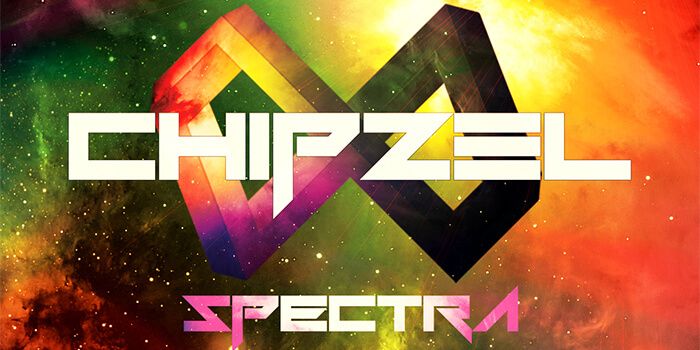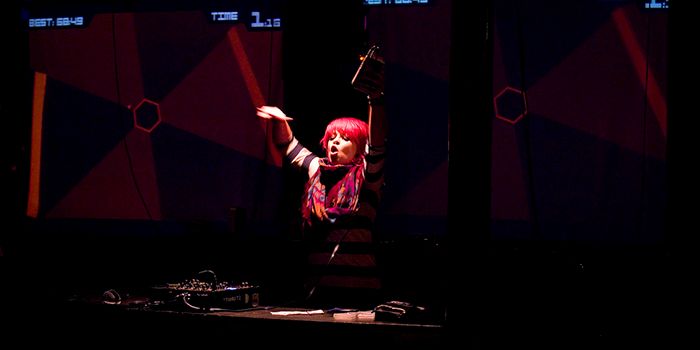Chipzel talks about breaking into the chiptunes genre and her exciting collaboration with indie devs on past and upcoming video game soundtracks.
Our favorite video game music is often the sound of nostalgia, but the music of Niamh Houston, known under stage name Chipzel, is nostalgic in an entirely different way. As a chiptune musician, Houston turns the familiar bleeps and bloops of the Nintendo GameBoy and other electronic into energetic and original tunes.
Though she got her start making her own music, it didn't take long for Houston to break into the gaming scene. She created the soundtrack for the highly addictive Super Hexagon, and her work will also be featured in the upcoming Spectra and Interstellaria.
Chipzel's Gaming Roots Form A Strong Musical Foundation
"I played games as a kid but didn’t have much of a collection for the Super Nintendo or the original Nintendo Gameboy, funnily enough!" Houston said in an email. "It was only when I got a Gameboy Color and a PS2 that I became hooked."
Though she might have started a little later than expected, her interest in video game music has a long history.
"The music was always my favourite element of ‘retro’ gaming to be honest," Houston said. "I absolutely loved the sound of the old consoles—there’s this really raw, gripping effect it has on you, completely at odds to any other form of music. Not to mention that sense of nostalgia, which takes you right back to your childhood."
Houston has been appreciating music for a long time, but making music was challenging at first. Though she taught herself some piano and guitar with help from her sister, it wasn't traditional music that appealed to Houston—it was the power and ability of computers to play a role in music creation.
"When I discovered chiptune it was just so perfect—I adored the sound, the way that the artists integrated their musical influences into something original and the fact that it was affordable and easily accessible," Houston said. "I followed some tutorials and read through the manual to get a gist of LSDJ and quickly began writing my own compositions. They were totally awful to begin with (laughs)—I just layered melodies, without any form or structure and experimented with it, which was so much fun. There wasn’t an expectation to perform to any particular standard, which felt very free—I liked that most."
Turning Original Chipzel Tunes Into Beloved Video Game Music
Chipzel's music wasn't originally made for video games—it was a form of expression for Houston that let her flex her creative muscles, not something she expected to turn into a career. But when Terry Cavanagh approached her to use her song "Courtesy" in Hexagon, she agreed.
"A few months later I had a follow-up from Terry about his plans to make an extended version of the game, which would be released on mobile platforms, with the hopes of including more of my tracks," Houston said. "Again, I was more than happy to be involved in the project so I agreed and we released the game a few months later. That’s when things got crazy! I had all these new followers who really loved the soundtrack, along with requests from developers for me to write music for their games. It was truly amazing and it felt like the right direction to go in."
Houston says that the writing process for games is significantly different than for her original work, as it forces her to work within certain boundaries and parameters. But that's not a bad thing—though she appreciates the freedom of creating her own music, the restrictions of working for someone else inspire a new kind of creativity.
"I actually enjoy working this way more than I thought I would because it pushes you out of your comfort zone and forces you to experiment and try out new things," she said. "It’s interesting because you have to work with the vision of the developer but also try to integrate your own personal touch."
Building An Indie Relationship For The Future
The relationship between Chipzel and indie gaming has been a positive one, and Houston hopes that's something that will continue in the future, as both indie devs and musicians blaze new trails in their fields.
"I absolutely love the idea of indies working together. Generally, we tend to have the same sort of views and aspirations, which can lead to a stronger bond and therefore more interesting developments," Houston said. "I guess you could say there’s a higher level of respect there too because you both/all need to make a living and it’s a ‘sink or swim’ sort of outcome for everyone involved. For me, this is extremely motivating, although terrifying at times, because you have that extra drive to produce work you’ll be proud of."
That extra drive is serving Houston well. With music in the works for the upcoming Spectra and Interstellaria, as well as other projects she can't yet discuss, she has her hands full. She's also working on her next Chipzel album, her first since 2013.
"I’m really excited for that because I’ve learned so much in the past two years and it’ll be really interesting to combine those new ideas and inspirations with my old style!" Houston said.


